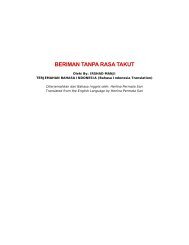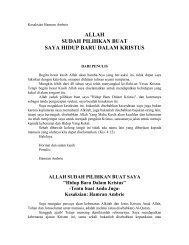A Critical Analysis of 'Real Islam'. Its People ... - Bukti dan Saksi
A Critical Analysis of 'Real Islam'. Its People ... - Bukti dan Saksi
A Critical Analysis of 'Real Islam'. Its People ... - Bukti dan Saksi
Create successful ePaper yourself
Turn your PDF publications into a flip-book with our unique Google optimized e-Paper software.
"When you meet the unbelievers in the battlefield strike <strong>of</strong>f their heads and, when you have laid them low, bind<br />
your captives firmly. Then grant them their freedom or take a ransom from them, until war shall lay down its<br />
burdens.'"<br />
"Commentary on the Surahs <strong>of</strong> Muhammad, Al-Fath, Al-Hujurat and Qaf, Grade 11, (2002) p. 9 …When you<br />
meet them in order to fight [them], do not be seized by compassion [towards them] but strike the[ir] necks<br />
powerfully.... Striking the neck means fighting, because killing a person is <strong>of</strong>ten done by striking <strong>of</strong>f his head.<br />
Thus, it has become an expression for killing even if the fighter strikes him elsewhere. This expression contains<br />
a harshness and emphasis that are not found in the word "kill", because it describes killing in the ugliest manner,<br />
i.e., cutting the neck and making the organ - the head <strong>of</strong> the body - fly <strong>of</strong>f [the body].' "<br />
Although chilling to our modern sensibilities, particularly when being taught to children, these are<br />
merely normative interpretations <strong>of</strong> the rules for jihad war, based on over a millennium <strong>of</strong> Muslim<br />
theology and jurisprudence. And the context <strong>of</strong> these teachings is unambiguous, as the translator makes<br />
clear that:<br />
"[the] concept <strong>of</strong> jihad is interpreted in the Egyptian school curriculum almost exclusively as a military<br />
endeavor… it is war against God's enemies, i.e., the infidels… it is war against the homeland's enemies and a<br />
means to strengthening the Muslim states in the world. In both cases, jihad is encouraged, and those who refrain<br />
from participating in it are denounced."<br />
Ibn Hudayl, a 14th century expert and author <strong>of</strong> an important treatise on jihad, explained forthrightly,<br />
sanctioned procedures and methods which contradict Islamic apologists erroneous assertions that certain<br />
war crimes, including razing beheading, are not sanctioned by Islam:<br />
"It is permissible to set fire to the lands <strong>of</strong> the enemy, his stores <strong>of</strong> grain, his beasts <strong>of</strong> burden – if it is not<br />
possible for the Muslims to take possession <strong>of</strong> them – as well as to cut down his trees, to raze his cities, in a<br />
word, to do everything that might ruin and discourage him, provided that the imam (i.e. the religious "guide" <strong>of</strong><br />
the community <strong>of</strong> believers) deems these measures appropriate, suited to hastening the Islamization <strong>of</strong> that<br />
enemy or to weakening him. Indeed, all this contributes to a military triumph over him or to forcing him to<br />
capitulate. [34]<br />
The late, seminal 20th century scholar <strong>of</strong> Muslim Spain and North Africa, Charles Emmanuel<br />
Dufourcq, characterized the impact <strong>of</strong> these repeated attacks, indistinguishable in motivation from<br />
modern acts <strong>of</strong> jihad terrorism (like 9/11/01 and, perhaps even more geographically relevant, 3/11/04):<br />
"It is not difficult to understand that such expeditions sowed terror. The historian al-Maqqari, who wrote in<br />
seventeenth-century Tlemcen in Algeria, explains that the panic created by the Arab horsemen and sailors, at<br />
the time <strong>of</strong> the Muslim expansion in the zones that saw those raids and landings, facilitated the later conquest, if<br />
that was decided on: ‘Allah,’ he says, ‘thus instilled such fear among the infidels that they did not dare to go<br />
and fight the conquerors; they only approached them as suppliants, to beg for peace.’ " [35]<br />
Al-Mawardi, a significant 11th century (Shafi’ite) jurist from Baghdad, wrote regarding the treatment<br />
<strong>of</strong> jihad POWs. The real issues at hand: what does Muslim Law actually instructs regarding jihad POWs<br />
in various campaigns conducted throughout Muslim history, and how does the spate <strong>of</strong> contemporary<br />
beheadings <strong>of</strong> prisoners <strong>of</strong> jihad terrorism comport with these rulings. Al-Mawardi’s writing makes clear<br />
that killing <strong>of</strong> jihad POWs is a primary (i.e., "first") option based solely upon what is most expedient for<br />
the Muslims:<br />
"As for the captives, the amir [ruler] has the choice <strong>of</strong> taking the most beneficial action <strong>of</strong> four possibilities: the<br />
first to put them to death by cutting their necks; the second, to enslave them and apply the laws <strong>of</strong> slavery<br />
regarding their sale and manumission; the third, to ransom them in exchange for goods or prisoners; and fourth,<br />
to show favor to them and pardon them. Allah, may he be exalted, says, 'When you encounter those [infidels]<br />
who deny [the Truth=Islam] then strike [their] necks' (Qur'an sura 47, verse 4)"....Abu’l-Hasan al-Mawardi, al-<br />
Ahkam as-Sultaniyyah." [36]<br />
Al-Mawardi was hardly unique, the views <strong>of</strong> this Shafi’ite jurist being nearly identical to those <strong>of</strong> key<br />
jurists representing the three other main Sunni schools <strong>of</strong> Islamic jurisprudence, including the Hanafites,<br />
who prevailed in Ottoman Turkey:<br />
Abu Yusuf (from the Hanafi school <strong>of</strong> jurisprudence, d. 798):<br />
"...that one can even ...finish <strong>of</strong>f the wounded, or kill prisoners who might prove <strong>dan</strong>gerous to the Muslims.. As<br />
for the prisoners who are lead before the imam, the latter has the choice, as he pleases, <strong>of</strong> executing them, or





